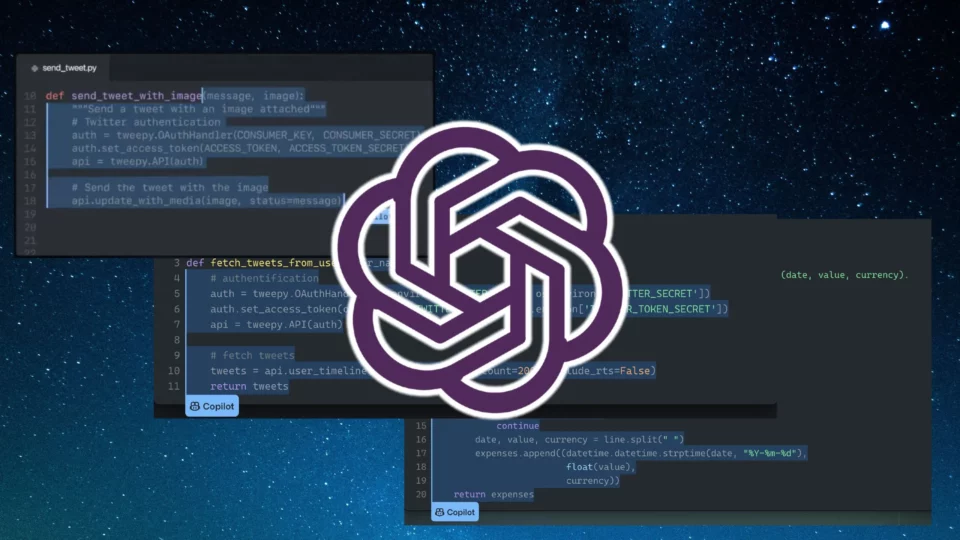In the digital frontier, AI tools attract tech experts globally, promising streamlined workflows and enhanced creativity. The appeal isn’t merely convenient but transformative, especially for professionals immersed in the convergence of innovation and automation. 💡
Meet OpenAI Codex, a tool finely attuned to the wavelength of today’s tech creatives and developers. It’s set to address their daily challenges by ushering in efficiency.
Picture the vast possibilities it unveils: automation eclipsing repetitive tasks, enabling a heightened focus on the core elements of product development and design.
This article serves as a guiding beacon, imparting knowledge on leveraging AI in content creation. It propels readers into a landscape where once-daunting tasks become effortlessly manageable.
The Intrigue of OpenAI Codex
What is OpenAI Codex?
OpenAI Codex, fundamentally a sophisticated machine learning model and an evolution of the esteemed GPT-3, is tailored specifically for programming. This tool excels in interpreting English instructions and translating them into various programming languages with remarkable proficiency. Its proficient code generation is a testament to its training on a diverse dataset comprising extensive public source code.
It not only displays Codex’s text-to-code translation but also highlights its potential as a collaborative assistant for programmers of all levels. Codex interprets various code-related queries adeptly, tailoring responses to specific use cases. 🖥️👩💻

The Advancements Over GPT-3
OpenAI Codex marks a significant leap over its predecessor, GPT-3, in its utility for coding tasks. The model has been finetuned to comprehend and produce code with a much higher accuracy rate. The distinct enhancement in its capabilities is evident in the sheer breadth of programming languages it understands—from Python to JavaScript and beyond.
Codex boasts augmented memory capacity, a standout advancement that enables it to process complex sequences and maintain context over longer stretches of code. This translates into more coherent and functional generated code, setting a new benchmark in the AI programming niche.
How OpenAI Codex Works
OpenAI Codex functions as a window into the model’s potential. Through this interactive experience, users can input English language prompts and witness the real-time translation into syntactically correct code. This demonstration serves as a practical exploration of the technology, elucidating its capabilities and efficiencies in a tangible, approachable manner.
It not only offers insights into the model’s performance but also serves as a hands-on tutorial for integrating Codex into diverse applications and workflows. It demystifies the transition from concept to code, making Codex an accessible tool for a broad range of professionals. 🎥💻
OpenAI Codex in Action
Codex’s real value becomes evident in action. GitHub’s Copilot, powered by Codex, exemplifies its utility by suggesting code snippets and completing lines of code. This practical application showcases how Codex streamlines the development process, enhancing human creativity with AI efficiency.
Aside from such tools, OpenAI Codex can be customized and integrated directly into specialized workflows through its API. This opens up opportunities for businesses and individual developers to tailor the AI’s functionality to their specific needs, creating bespoke solutions that drive forward innovation and productivity within their software ecosystems.
Navigating the AI Coding Landscape
Enhancing the Developer Experience
OpenAI Codex represents a transformative moment in the coding universe. Picture crafting code through conversational English – a capability with the potential to make programming more intuitive for newcomers and less daunting. Simultaneously, it offers seasoned developers a powerful tool to expedite their workflows. 🗺️
These AI-driven tools narrow the gap between thought and implementation, creating a more fluid channel for innovation. The convergence of code and natural language processing signifies a growing synergy between human intellect and machine learning technologies.
Automating Routine Coding Tasks
Automation of routine tasks stands as one of the most practical benefits OpenAI Codex offers. By automating mundane coding tasks, developers can redirect their focus toward more complex and creative aspects of their projects. This reallocation of human resources to high-value tasks could significantly enhance both productivity and job satisfaction.
Moreover, Codex’s ability to handle such tasks reliably also implies a reduction in human error, a critical factor in programming. As a result, the overall quality of software could see improvements, thanks in part to the consistency and accuracy that machine learning models like Codex bring to the table. 🔄🤖
Revolutionizing Content Creation and App Development
OpenAI Codex profoundly impacts content creation and app development. Its ability to understand the context and generate relevant code snippets empowers creators to mold and iterate digital products with remarkable agility. Access to high-quality code generation fosters innovation, freeing developers from the tedium of standard coding operations.
Codex’s influence is evident in the growing number of apps and tools leveraging its capabilities, expanding horizons for tech entrepreneurs and content creators. AI-assisted app development accelerates time-to-market and enhances user experience with smarter functionalities and refined interaction dynamics.

Training and Tailoring Codex to Specific Needs
Integrating Codex into a professional’s toolkit involves the crucial ability to train the model for domain-specific requirements. This tailoring process enhances Codex’s precision in generating code aligned with specific business logic, APIs, or unique programming scenarios.
Exploring Codex, organizations can fine-tune APIs to enhance the model’s performance, ensuring better alignment with their unique ecosystem. This bespoke optimization presents the opportunity for a virtually custom-coded assistant that comprehensively understands the inner workings of specific software environments. 🧰👩💼
Case Studies and Industry Insights
Putting Theory into Practice
OpenAI Codex demonstrates promise in practical scenarios, proving its real-world application. For example, a Berlin-based startup utilized Codex to program collaborative robots, generating entire code blocks from single-line instructions. This small feat illustrates AI’s power in facilitating futuristic R&D projects.
Dr. Joshua Davidson, a postdoctoral researcher, expressed his impression of Codex: “I am truly impressed by OpenAI Codex, and my big congrats to the whole team! Really excited to continue exploring.” Codex emerges not just as a coding tool but as a collaborative partner in innovation.
Testimonials from the Front Lines
Industry professionals testify to Codex’s transformative impact. A Silicon Valley CTO noted, “Integrating Codex accelerated our feature deployment, fostering customer-centric innovation.”
A New York content creator echoed similar sentiments, citing Codex’s efficiency in translating visions into interactive web elements. These anecdotes highlight OpenAI Codex’s real-world significance and utility.

Strengthening Business Applications
OpenAI Codex strategically integrates into enterprise applications, addressing the imperative for businesses to swiftly adapt to new technologies. A Bangalore-based R&D manager, for instance, streamlined their operational workflow by leveraging Codex to simplify custom logic creation in their enterprise application.
This case exemplifies Codex’s indispensable role in businesses navigating the dynamic corporate tech landscape. Its impact spans from internal processes to customer-facing applications, showcasing its versatile applicability.
Collaboration and Community Engagement
Fostering an environment of collaboration, OpenAI has not only released Codex as a standalone model but has also encouraged the developer community to engage with and enhance its capabilities. Moreover, London-based product developers have found Codex an ally, reporting how they integrated Codex’s API to build community-driven projects that scaled with the input of collective expertise.
Linking these developmental innovations to the repository of shared knowledge, product developers and content creators form an ecosystem where collective intelligence shapes the trajectory of AI development. This paradigm demonstrates the symbiotic relationship between communities and AI tools like Codex, facilitating a more interconnected and responsive tech environment.
Embracing the Future of AI in Content Creation
Your Gateway to Enhanced Productivity
Familiarization with OpenAI Codex serves as a gateway to a new dimension of productivity and innovation. The technology represents a shift in how we approach problem-solving, coding, and product development, streamlining processes that were once laborious and time-consuming.
The empowering attributes of Codex provide an invoked sense of creativity, allowing for a more flexible and dynamic approach to content creation. It stands as a paradigm of AI utility—a tool that not only performs a function but transforms the very landscape in which it operates.
Main Takeaways
Exploring OpenAI Codex, one can truly appreciate the pivotal role that AI-driven technologies will play in the ongoing transformation of content creation and development practices.
First and foremost, having traversed its capabilities, we can recognize its potential in real-world applications.
Additionally, when observing industry testimonials that highlight its profound impact, it becomes evident that Codex is at the forefront of innovation. 🚀
The knowledge and insights gained here represent a key that unlocks the door to a more streamlined, intuitive approach to coding. Notably, this approach synergizes the best of human creativity with the precision of AI efficiency.
As we continue forward, Codex stands out not only as a valuable companion but also as a catalyst in the journey toward a smarter and more resourceful digital future. Moreover, its role becomes increasingly significant as we embrace the possibilities of a more interconnected and intelligent technological landscape.
- The Agentic Startup Manifesto - June 8, 2025
- Remote Hiring in 2025 - April 5, 2025
- Burnout in Remote Teams: How It’s Draining Your Profits - January 27, 2025
